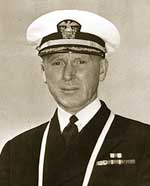Norman Scott

Amerikansk kontreadmiral. Dræbt på sit flagskib Atlanta under søslaget ved Guadalcanal.
- Guadalcanal- flådeaktion, 1942
Norman Scott was born in Indianapolis, Indiana, on 10 August 1889. Appointed to the U.S. Naval Academy in 1907, he graduated four years later and received his commission as Ensign in March 1912. During 1911-13, Ensign Scott served in the battleship Idaho, then served in destroyers and related duty. In December 1917, he was Executive Officer of USS Jacob Jones when she was sunk by a German submarine and was commended for his performance at that time. During the rest of World War I, Lieutenant Scott had duty in the Navy Department and as Naval Aide to President Woodrow Wilson. In 1919, while holding the temporary rank of Lieutenant Commander, he was in charge of a division of Eagle Boats (PE) and commanded USS Eagle # 2 and Eagle # 3.
During the first years of the 1920s, Norman Scott served afloat in destroyers and in the battleship New York and ashore in Hawaii. From 1924 to 1930, he was assigned to the staff of Commander Battle Fleet and as an instructor at the Naval Academy. He commanded the destroyers MacLeish and Paul Jones in the early 1930s, then had further Navy Department Duty and attended the Naval War College's Senior Course. After a tour as Executive Officer of the light cruiser Cincinnati, Commander Scott was a member of the U.S. Naval Mission to Brazil in 1937-39. Following promotion to the rank of Captain, he was Commanding Officer of the heavy cruiser Pensacola until shortly after the United States entered World War II in December 1941.
Captain Scott was assigned to the Office of the Chief of Naval Operations during the first months of 1942. After becoming a Rear Admiral in May, he was sent to the south Pacific, where he commanded a fire support group during the invasion of Guadalcanal and Tulagi in early August. Rear Admiral Scott continued to lead surface task units for the next three months, as the campaign to hold Guadalcanal intensified. On 11-12 October 1942, he commanded a cruiser-destroyer force in the Battle of Cape Esperance, the U.S. Navy's first surface victory of the campaign. A month later, on 13 November, he was second-in-command during the initial night action of the Naval Battle of Guadalcanal. In that wild and brutal fight, Rear Admiral Norman Scott was killed in action when his flagship, the light cruiser Atlanta, was fatally damaged by gunfire and a torpedo. For his "extraordinary heroism and conspicuous intrepidity" in the October and November battles, he was posthumously awarded the Medal of Honor.